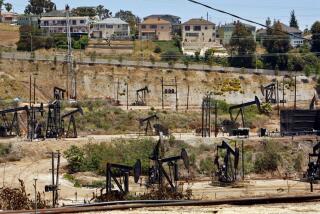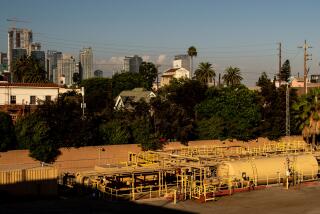U.S. Seeking to Protect Iraqi Oil Fields
- Share via
MAMLAHAH, Kuwait — With war on Iraq underway, a primary concern is how to protect the country’s vast oil fields from massive fires that could cause environmental devastation and all but halt the oil production that U.S. and allied planners are counting on to finance Iraq’s postwar reconstruction.
The planners worry that Saddam Hussein, who ordered retreating Iraqi forces in 1991 to torch hundreds of Kuwaiti wells, could instruct his troops to do the same thing in his own country as a final, desperate act of defiance, and perhaps deterrence, aimed at incoming coalition forces.
The Iraqi leader has strenuously denied that he would order the destruction of his nation’s resources. But some intelligence reports suggest that several Iraqi oil fields might already be rigged with explosives. Military commanders here say they have devised several strategies to prevent or minimize the damage.
Within days of the initial air bombardment, defense officials and military analysts say, thousands of light-infantry troops are expected to drop into northern Iraq to seize the region’s oil fields, keep potentially warring ethnic factions apart and prepare for a possible southward march toward Baghdad.
Leapfrogging the enemy via helicopter and cargo planes in a strategy called “vertical envelopment,” these foot soldiers would be charged with overwhelming the Iraqi forces and preventing them from setting fire to the fields.
Pentagon strategists are expected to combine elements of the 101st Airborne Division from Ft. Campbell, Ky., with the 173rd Airborne Brigade from Vicenza, Italy, and a brigade from the 82nd Airborne Division, based at Ft. Bragg, N.C. They probably would be complemented by Army Rangers and other special operations troops, including units from the 5th Special Forces Group, which shares its Kentucky base with the 101st Airborne.
With its brigades of helicopters and battalions of mobile troops, the 101st Airborne is capable of securing oil fields or any other strategic target.
“We can move infantry to any site, including oil fields, relatively easily,” said Lt. Col. Timothy A. Jones, commander of the 9th Battalion, 159th Aviation Brigade (Assault) of the 101st Airborne Division. “That’s not the focus of this unit, but it’s certainly within the scope of our operations.”
But just how extensive that assault can be remains open to question. Given that the coalition has been barred from bringing tanks and armored vehicles through Turkey, these forces will have to rely on U.S. warplanes to defend them against Iraqi tanks and artillery.
The Turkish parliament last month voted against allowing the United States to base up to 62,000 heavily armed troops in Turkey for an attack on Iraq, leaving the tanks and Bradley fighting vehicles of the armored 4th Infantry Division in transport ships floating in the Mediterranean Sea.
“People often say that war plans don’t survive contact with the enemy. This plan hasn’t even made it that far,” said Loren Thompson, a defense analyst with the Lexington Institute, an Arlington, Va.-based public policy group.
Military officials in Kuwait say that quickly securing the oil fields is a top priority of the invasion strategy.
“Safeguarding the Iraqi people’s oil -- and that’s truly how we look at it -- is extremely important to us,” said Maj. Chris Hughes of the Marines, a spokesman for the Coalition Forces Land Component Command in Kuwait.
“There is an incredible natural resource available to the Iraqi people to help them reestablish their society, and we will work to make sure it’s available, and that a significant environmental disaster is not inflicted,” he said.
In 1991 in Kuwait, it took nine months and $20 billion to contain the fire damage to the oil fields and restore production.
“The whole sky was black for weeks on end,” recalled Fahad Dousair, an engineer at the Burgan oil field in Kuwait. “You could not see the sun.”
If Hussein were to do the same thing in Iraq, the damage could exceed $50 billion, experts say.
“The wells in Iraq are much higher-yield. They’re farther apart. The terrain is more difficult. There may not be enough water nearby,” said Robert Ebel, energy program director at the Center for Strategic and International Studies, a Washington-based think tank. “It would be one god-awful mess.”
A serious disruption of Iraqi oil production probably would be more damaging to Iraq than to world economies, many experts say. The thinking is that other countries, notably Saudi Arabia, could quickly boost production to offset the loss of crude from Iraq.
But there are also concerns that terrorist attacks could target the vast Saudi Arabia oil fields and also those in Kuwait. Major damage to those production facilities could pose far greater problems for Western economies, which would almost certainly face oil shortages and drastic price spikes.
The damage in Kuwait more than a decade ago involved about 700 wells. About 500 wells could be sabotaged in northern Iraq’s Kirkuk field, Ebel said, and about 1,000 in the giant Rumaila field in the south.
To prevent destruction, the 173rd Airborne Brigade and a brigade from the 82nd Airborne Division probably would be the first major Army force to hit the ground in the north, because each can drop 4,000 light-infantry troops and equipment entirely by parachute.
They probably would seize or borrow one or more airfields in the Kurdish north, possibly with help from Green Berets and other special operations units, analysts said, clearing the way for the 101st. As a heavier light-infantry force, the 101st requires airstrips so C-130 cargo planes full of vehicles and other equipment could land.
It’s unlikely that the entire 16,000-member 101st Airborne -- which is in heavy demand -- would be confined to occupying airfields and the Kurdish territory in the north. With Black Hawks and other aircraft, the division has 250 helicopters, the most lethal of which is the AH-64 Apache attack helicopter that carries Hellfire missiles, rockets and 30-millimeter cannons capable of destroying tanks from a distance.
Military planners here will not comment on how many troops could be assigned to firefighting duty in the event that wells are set ablaze, or how quickly they can bring in the heavy and specialized equipment needed for such work.
But dealing with potential fires is an obvious concern because, as Anthony Cordesman, a former Pentagon official and Iraq expert now at the Center for Strategic and International Studies, puts it: “You can never get anyone there quicker than someone can flip a switch.”
John Pike, a military analyst at Globalsecurity.org, agreed, but he added that U.S. special operations forces may have already begun working with locals to defuse explosives and prevent oil field fires.
What if the coalition forces are not able to control the fields before Iraqi saboteurs set fire to them?
There are several companies in the U.S. and Europe with expertise in fighting oil well fires, some of which were involved in containing the Kuwait damage. But given that they are civilian outfits, it is unclear how quickly they could be flown into a place that might still be considered a war zone.
In some cases, especially in more remote areas where fire or smoke would not compromise military missions, the wells could simply be left to burn for weeks on end, which is what happened in Kuwait. That could take away billions of dollars of potential revenue for reconstruction and cause severe environmental degradation.
In other cases, though, capping the wells could become an urgent strategic priority. The troops who are called in for this task -- some of whom may have firefighting experience, because many civilian firefighters are military reservists -- would have their hands full.
One Kuwait-based Western engineering company executive, who asked not to be identified because he is currently consulting with the U.S. military, said that on many levels the challenge could be greater in Iraq than it was in Kuwait.
Many Iraqi wells have greater daily production than Kuwaiti wells, making the fires potentially bigger.
And getting water to the fires would be far trickier. In Kuwait, seawater from the Persian Gulf was pumped to many wells by reversing the flow in the country’s oil pipelines. But most Iraqi wells are much farther from the gulf than those in Kuwait.
“If it can’t be capped in reasonably quick order, then you have a Hobson’s choice, all kinds of bad alternatives,” the executive said.
“Sometimes the best thing you can do is whatever you can to exacerbate the fire and get the well to burn out. Smoke pollution isn’t as bad as extensive ground pollution.”
*
Times staff writers Warren Veith in Washington and David Zucchino with the 101st Airborne contributed to this report.
More to Read
Sign up for Essential California
The most important California stories and recommendations in your inbox every morning.
You may occasionally receive promotional content from the Los Angeles Times.













